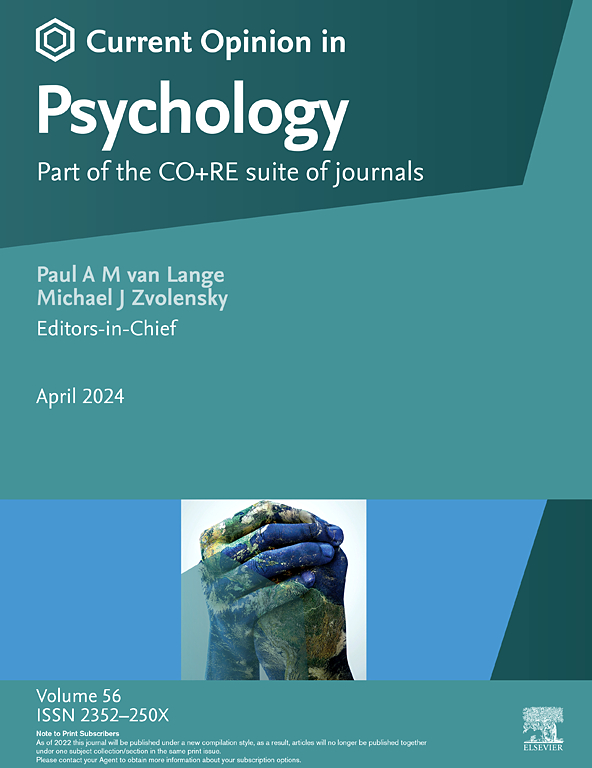集体行动控制:无处不在的过程与文化差异
IF 6.3
2区 心理学
Q1 PSYCHOLOGY, MULTIDISCIPLINARY
引用次数: 0
摘要
人类有两种超能力:达到预期的最终状态(目标)和协同工作(合作)。我们将这两种能力概念化为一体:集体行动控制。我们在两个既定框架--社会认同和规范--以及一个新兴的意图归因视角的背景下,讨论了集体行动控制的普遍过程和(潜在的)文化差异。我们通过讨论在追求目标过程中对批评反馈的反应来说明集体行动控制过程,有关拒绝群体间批评(群体间敏感效应)的研究就是一个例子。已有的框架无法预测当前的经验观察模式。因此,我们呼吁通过系统的理论建设和研究来发展意图归因理论,以确定集体行动控制的普遍过程和特定文化过程。本文章由计算机程序翻译,如有差异,请以英文原文为准。
Collective action control: Ubiquitous processes and cultural differences
Humans have two superpowers: reaching desired end-states (goals) and working together (cooperation). We conceptualize these two capabilities as one: collective action control. We discuss ubiquitous processes and (potential) cultural differences in collective action control in the context of two established frameworks—social identity and norms—as well as an emerging attribution of intent perspective. We illustrate collective action control processes by discussing responses to critical feedback during goal pursuit, as exemplified in research on the rejection of intergroup criticism (Intergroup Sensitivity Effect). Established frameworks did not predict the pattern of current empirical observations. We therefore call for developing the attribution of intent account through systematic theory building and research to identify the ubiquitous and culture-specific processes of collective action control.
求助全文
通过发布文献求助,成功后即可免费获取论文全文。
去求助
来源期刊

Current Opinion in Psychology
PSYCHOLOGY, MULTIDISCIPLINARY-
CiteScore
12.10
自引率
3.40%
发文量
293
审稿时长
53 days
期刊介绍:
Current Opinion in Psychology is part of the Current Opinion and Research (CO+RE) suite of journals and is a companion to the primary research, open access journal, Current Research in Ecological and Social Psychology. CO+RE journals leverage the Current Opinion legacy of editorial excellence, high-impact, and global reach to ensure they are a widely-read resource that is integral to scientists' workflows.
Current Opinion in Psychology is divided into themed sections, some of which may be reviewed on an annual basis if appropriate. The amount of space devoted to each section is related to its importance. The topics covered will include:
* Biological psychology
* Clinical psychology
* Cognitive psychology
* Community psychology
* Comparative psychology
* Developmental psychology
* Educational psychology
* Environmental psychology
* Evolutionary psychology
* Health psychology
* Neuropsychology
* Personality psychology
* Social psychology
 求助内容:
求助内容: 应助结果提醒方式:
应助结果提醒方式:


